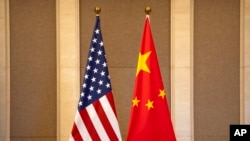An international military forum beginning on Sunday in Beijing is expected to provide an opportunity for direct military-to-military contact between the United States and China, the latest sign of an easing of tensions between the two superpowers.
A Pentagon spokesperson confirmed to VOA that the United States will be represented at the 10th Xiangshan Forum by Xanthi Carras, the Defense Department's principal director for China, Taiwan and Mongolia.
A spokesperson for the Chinese Ministry of National Defense announced this week that Russia, Britain and Saudi Arabia also will be among the more than 90 countries, regions and international organizations attending the three-day forum. More than 30 of the delegations will be led by a defense minister or military chief of staff.
Signs of thaw
The fact that the United States was invited suggests an easing of Beijing's freeze in high-level military-to-military communications that was imposed after then-U.S. House Speaker Nancy Pelosi visited Taiwan in August last year.
Other recent contacts have included talks in early August between Ely Ratner, U.S. assistant secretary of defense for Indo-Pacific security affairs, and Yang Tao, director of the department of North American and Oceanian affairs at China's Foreign Ministry.
Defense officials of the two countries also held a hybrid in-person and virtual meeting in late September to discuss the contents of a recent Pentagon strategy document, including a range of cyber-related topics.
"In terms of hopefully, kind of kick-starting some of the military-to-military engagements, yes, I'm hopeful that we'll have an opportunity to do that in the coming months," said Michael Chase, U.S. deputy assistant secretary of defense for China, at a public event this week.
The signs of a military-to-military thaw accompany other indications of a desire on the part of both countries to ease tensions and avoid misunderstandings over incidents like Thursday's near-miss between a Chinese fighter jet and an American bomber over the South China Sea.
"China and the United States need to have dialogue," Chinese Foreign Minister Wang Yi said Friday. "Not only should we resume dialogue, the dialogue should be in-depth and comprehensive, so that with dialogue we can increase mutual understanding, reduce misunderstanding and misjudgment."
'A small step'
Some U.S. analysts cautiously welcomed the apparent breakthrough on military contacts.
"I think the fact that the Department of Defense was willing to send a delegation, and indeed that the Chinese invited that delegation, is a small step forward in military-to-military relations. But it is only a small step," said Dennis Wilder, senior fellow for the Initiative for U.S.-China Dialogue on Global Issues at Georgetown University.
Wilder told VOA there are many levels of exchange between the U.S. and Chinese militaries "that are quite crucial for keeping stability in East Asia that have not been restored and need to be restored."
But Richard Fisher, a senior fellow at the International Assessment and Strategy Center, told VOA that the American delegation at the forum will likely be treated with suspicion and used for propaganda.
"The Chinese Communist Party propaganda apparatus will try to convey this as a symbol of American acceptance of Chinese positions," he said.
The prospects for a significant change in military-to-military communications are complicated by the vacancy at the top of China's defense establishment following the official removal this week of Defense Minister Li Shangfu.
The United States "has to wait for the key person to be in the key position to be able to decide who to talk to and how to progress … in repairing these ties that have been cut since August 2022," said Lionel Fatton, assistant professor of international relations and outreach coordinator to the U.N. and NGOs at Webster University Geneva.





